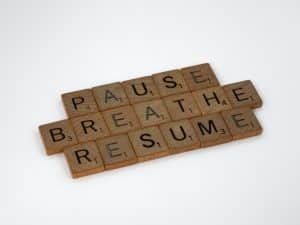
If, as Socrates allegedly said, the “the unexamined life is not worth living,” then my guess is that logic would lead you to say that your life lately must be pretty worthwhile. Even more, Socrates was on trial when he said it – an exam, a test and a mental endurance challenge all in one. Now, no matter how tough your GMAT/GRE journey, your final exam schedule, or your end-of-year close timeline, I am pretty confident your season of testing will end better than his did. The question is, can you remain as present as he (apparently) did under fire, capable of spouting wisdom on demand (and you know it will be demanded…)? Maybe first I should ask: how’s your mindfulness practice going?
If the answer to that second question at the moment is, “If by mindfulness you mean binge-watching five year-old shows and questioning the health code status of my remaining leftovers, then it’s excellent,” have no fear. You can know you can start – and restart – your mindfulness practice anytime, right? And you don’t have to do a lot to get it done. Pick an app (Buddhify, Headspace, Calm, etc…) and listen to it for even a few minutes. No one’s grading you on this one, so do what you can. There’s no judgment, or self-judgment, in mindfulness. If you’re doing it, you’re always doing it right. Fantastic – now back to the real tests.
In my experience taking tests myself, and also coaching others through their own testing journeys, I’ve noticed something. No matter how intensive and focused the testing situation, it’s hard to get your brain to cooperate. It’s funny, because exams are nothing if not intellectual challenges. So if you’re brain’s not into this, what is it into, right?
It’s not as though your brain isn’t paying attention to the exercise at all, it’s just that’s not all it’s doing. It’s also running a narrative for you about how it’s all going. For example, on the GMAT or GRE: “This question seems easy. I bet it means that I messed up somewhere earlier in the section. This isn’t going very well – again. My score isn’t going to go up, and I’m going to be right back where I started. Plus, I’m probably not going to get into my dream school, and my mom/brother/best friend/boyfriend/neighbor’s cat is going to be so disappointed…” Chances are, your brain is capable of thinking all of that in a fraction of the time it took me to type it, and I’m pretty quick on the keyboard. In fact, it may pass through so quickly that you don’t even realize it happened. Diabolical, isn’t it?
Negative self-talk is a defense mechanism of sorts. It tries to keep us playing small so we won’t be surprised by outcomes that don’t fulfill our wildest dreams. It tries to justify failure as expected to give us an excuse to try to bypass the disappointment, sadness and frustration that comes with missing the mark. Problem is, it can also be a self-fulfilling prophecy. If you approach a challenge by telling yourself that you can’t do it, then guess what? You’re probably right.
The first step towards quieting that inner critic is to notice it. I know I’m preaching to the choir here, but this is where mindfulness can really come in handy. Mindfulness trains your brain to notice your thoughts, and to intentionally turn your focus – temporarily – away from them and towards something else. Sounds like a pretty useful skill for that moment when you realize you’ve been staring at a question without actually trying to solve it for a full minute already, right?
Thinking about a challenging task and actually doing it are two different things. If you’re familiar with the fine art of procrastination, you already know this. But, you may not recognize that you’re doing the same thing when you let your brain start telling you stories in the midst of a challenging task. You’re distracting yourself with something that, while it may be “negative,” is also more familiar, and therefore, less uncomfortable. Keep flexing that mindfulness muscle on the daily, and you will strengthen your ability to see when that’s happening, and redirect yourself back to the task at hand. It may not get you any extra credit, but it will at least get you the credit, aka outcomes, that you deserve from the work you’ve put in to prepare.
OK, now back to work. I’ve distracted you long enough, and despite what your brain might have you believe, that test is not going to take itself.
Photo credit: Tony Lam Hoang




5 thoughts on “Tested”
Great advice! I wish I had discovered mindfulness back in my university days.
Me too, Myles! Better late than never, though, for both of us 🙂 And we all face challenging tasks of one kind or another throughout our lives, so same rules apply!
Very true 🙂
Pingback: No-Fail Friday: Going negative | MindfulMBA
Pingback: Questionable story | MindfulMBA